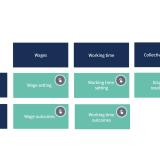Eurofound provides regular updates on pay in the EU, including an annual study on how minimum wage rates have developed across the EU (as well as Norway), reviewing how national governments and social partners engage in setting new rates. It also looks at the concept of a living wage, aimed at guaranteeing workers and their families a decent level of living and social participation in response to the inadequacy of income for many working households reliant on existing national minimum wage rates.
Pay developments
The annual review on minimum wages for 2024 summarises how minimum wage rates were set during 2023. Eurofound published a set of minimum wage country profiles in May 2024 which provide detailed background information on how minimum wages are set and regulated in the EU and Norway.
In an earlier study on pay in Europe in the 21st century, Eurofound explored the implications of a hypothetical scenario of a minimum wage coordinated at EU level and set at 60% of the median national wage.
Impact of COVID-19 for low-wage earners
COVID-19 is likely to impact the ongoing minimum wage debate, as many workers delivering essential services during the pandemic are at the bottom of the pay ladder, like workers in retail, food-supply chains or care roles. Others low-wage workers, like workers in the accommodation and food sector, or in leisure and entertainment services, were the first affected by unemployment during the pandemic. It will be important to see how minimum wages can contribute to the policy measures governments and social partners are applying to cushion the economic and social impacts. Eurofound’s e-survey on Living, working and COVID-19 shows that nearly half of households in the EU are struggling to makes ends meet. Minimum wages could play a policy role in stabilising incomes.
Minimum wage versus living wage
Most EU countries have a national minimum wage. A related but distinct concept is that of a living wage, which is a wage designed to secure a basic but acceptable standard of living for its earner (and, in some cases, household dependents). The living wage rate is based on a detailed, regularly updated costing of the basic services and goods required for such a standard of living and is intended in part to reflect the inadequacy of prevailing statutory minima for that end. Living wage campaigns are generally voluntary and rely on coalitions of interest groups, trade unions and employers working together. These campaigns can take on an advocacy role (Ireland) as well as an accreditation role (UK) where organisations are formally accredited as living wage employers. In line with the fair wage provisions set out in the European Pillar of Social Rights, Eurofound research aims to provide policymakers with a practical guide to the living wage concept.

































































